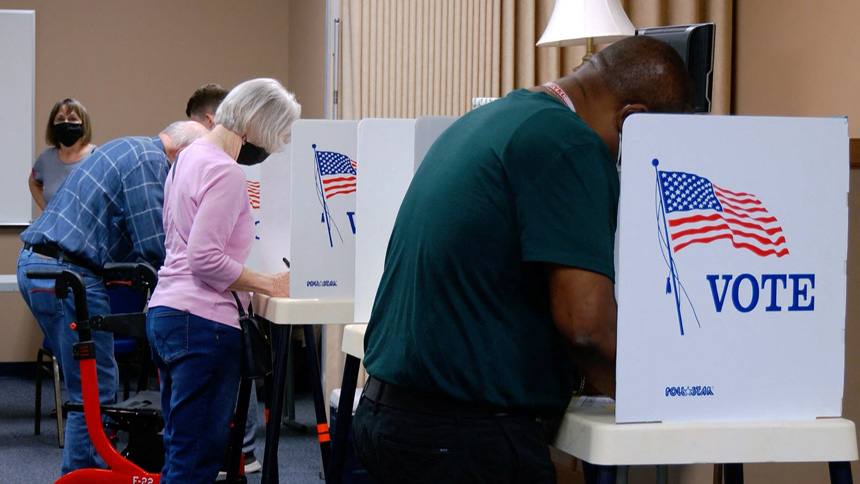
CNS photo/Eric Cox, Reuters
With midterm elections quickly approaching, Father Michael Burbeck, Vicar General for the Diocese of Raleigh, recently shared his thoughts on key points from the United States Conference of Catholic Bishops (USCCB)’s document Forming Consciences for Faithful Citizenship to aid Catholics as they prepare to vote.
For additional information and/or guidance, see the complete USCCB teaching document, Forming Consciences for Faithful Citizenship, which provides additional guidance for all who seek to exercise their rights and duties as citizens.
Though the bishops do not endorse any particular candidate or party, they do articulate principles that must inform us as Catholics as we make the decision to vote according to our own conscience. Our conscience is the inner voice that moves us to do good and avoid wrong. It is not merely about us or our preferences but about our relationship to the truth. If we are to act in accord with the truth and do what is good, we must educate ourselves about the truth of a given situation. Our task, then, is to take the principles and the general truths about the dignity of the human person and the nature of a just society, which the bishops articulate, and in accord with the truth, use them to evaluate each candidate, party platform, and vote we cast.
Non-negotiables
The first among these principles is the recognition that not all issues carry equal moral weight. Where some issues admit of legitimate disagreement, other policies are so contrary to the dignity of the human person that they may never be accepted. As the bishops state, “There are some things we must never do, as individuals or as a society, because they are always incompatible with love of God and neighbor. Such actions are so deeply flawed that they are always opposed to the authentic good of persons. These are called “intrinsically evil” actions. They must always be rejected and opposed and must never be supported or condoned.” Abortion and euthanasia are prime examples of such evils, as they attack innocent life. Others are “racism, treating workers as mere means to an end, deliberately subjecting workers to subhuman living conditions, treating the poor as disposable, or redefining marriage to deny its essential meaning” (USCCB §22).
Such evils may never be condoned or even passively tolerated. As such, “A Catholic cannot vote for a candidate who favors a policy promoting an intrinsically evil act … if the voter’s intent is to support that position” (USCCB §34). This is a tall order, as social pressures increasingly push us to accept evil as normal and overlook behavior and policies that attack the dignity of the human person. We must never be party to such behavior and may never dismiss or take lightly a candidate’s support for evil or attacks on human dignity in the name of party loyalty or personal comfort. Those are the non-negotiables and the starting point for all further involvement in the political process.
Dignity of the human person, subsidiarity, the common good and solidarity
Rounding out our brief introduction to the USCCB’s document, Forming Consciences for Faithful Citizenship, we now turn to the four general themes of Catholic teaching regarding political life and the organization of a just society. They are the dignity of the human person, subsidiarity, the common good, and solidarity. Notice that the non-negotiables discussed all touch on the dignity of the human person, which is the first and most essential of the four. It is “the foundation of a moral vision for society,” and no other good can be pursued at the expense of a direct attack on human dignity. The remaining principles represent the practical consequences of respecting human dignity in the arrangement of society.
Subsidiarity highlights the value of local, personal relationships and encourages larger institutions and higher levels of government to exercise restraint and give space for the family, the Church, and other smaller associations to flourish. Subsidiarity encourages policy and power to remain as close to the people involved as possible, with higher levels of government in the background as support. It recognizes the danger of an all-powerful state eclipsing the role of the family, religious bodies and other associations in building up society.
This push to the local and personal is balanced by a concern for the common good. The common good recognizes that each individual is also called to build up a society that serves the good of all, not only their own interests. This principle calls us to a shared stewardship of wealth, creation, and to build a society that serves the good of all. And, finally, solidarity, which in a similar vein calls us to regard all people as our brothers and sisters and to respect the dignity of all persons, especially the poor and marginalized. These four together are the principles that guide the formation of a just society and are the standards against which we are called to judge candidates and policies.
I hope these reflections have offered a helpful perspective and encouraged you to bring your faith to bear on your political involvement. Together, let us pray that our nation as a whole will more fully uphold the dignity of the human person and build a more just society.

